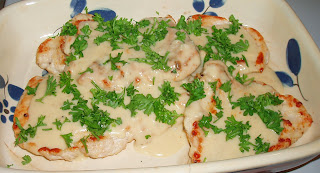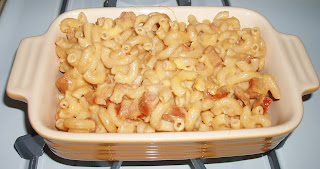Chicken Piccata - January 2, 2010

This is going to be one of those times where you can laugh at my cooking attempts. I wanted to try this recipe for Chicken Piccata (also from The Most Decadent Diet Ever by Devin Alexander) because it seemed like another straightforward dish to make. It looked a little more involved than the Mac and Cheese recipe and I had to get a meat mallet for it but I was game to give it a try.
First, I pounded the chicken breasts as directed in the recipe. I've never pounded anything with a meat mallet before but I was impressed that it actually worked! Only thing is the recipe says to pound to an even 1/4" thickness but that seemed a little thin to me. I know it's to make the chicken tender and that's how thin chicken piccata is supposed to be but I'm not a fan of something that thin. So I cheated and only pounded to about 1/3" to 1/2" thickness. The chicken breasts I'd started with were pretty thick so it took some whacking to even get to that level of thinness. And the breasts definitely spread in size.
Second, I set up the rest of the ingredients into my mise en place. Only to run into a snag with the wine (this is the part where you can laugh at me). I don't drink but I'm not opposed to cooking with alcohol and I did buy a bottle of dry white wine at Trader Joe's because that's what the recipe called for. But if you don't drink, you know what you don't have in your house? Yep, that's right - a wine opener. Which I realized as I was getting the ingredients ready and ended up staring blankly at the wine bottle and the cork firmly ensconced in the neck. I didn't want to give up on the recipe and postpone making it since I'd already whacked the chicken breasts into submission and squeezed fresh lemon juice from the lemons from my mom's tree. So I forged ahead and used more chicken broth in place of the wine. I also didn't have capers because when I went grocery shopping, I couldn't find them, had no idea where to look and couldn't find anyone in the store who knew where they were either. Other than those 2 liberties, I followed the recipe as directed.
I have to say I really like how this turned out. I actually managed to cook the chicken breasts to the right desired doneness and they were tender. Best of all, I really liked the sauce. Sometimes chicken piccata is too lemony or seemingly nothing more than chicken with lemon juice but not in this case. The sauce was creamy and had just the right amount of lemon flavor. I don't know how it would taste with wine like in the original recipe but even with just the chicken broth in the sauce, it was very tasty. This is something I could easily make for company so I'm pretty happy about that - a recipe I not only like but can actually cook!
Chicken Piccata from The Most Decadent Diet Ever by Devin Alexander
2 ½ tablespoons unbleached all-purpose flour, divided
¼ teaspoon salt, plus more to taste
¼ teaspoon black pepper, plus more to taste
¼ teaspoon garlic powder
Four 4-ounce boneless, skinless chicken breasts, visible fat removed
¼ cup fat-free half-and-half
2 teaspoons plus 2 tablespoons light butter (stick, not tub), divided, room temperature
½ cup canned fat-free, lower-sodium chicken broth, plus more if needed
1/3 cup dry white wine
¼ cup fresh lemon juice
1 ½ teaspoons minced fresh garlic
2 tablespoons capers, drained
2 tablespoons chopped fresh parsley
1. Combine 1 ½ tablespoons of the flour with ¼ teaspoon salt, ¼ teaspoon pepper, and the garlic powder on a dinner plate. Use a fork or your fingers to mix well.
2. Pat the chicken breasts dry with paper towels to ensure that they are as dry as possible. Place them between two sheets of plastic wrap or wax paper on a flat work surface. Use the flat side of a meat mallet to pound them to an even ¼-inch thickness. Dip one breast at a time into the flour mixture to coat on all sides. Shake off any excess and transfer the breasts, to a clean plate, side by side (don’t pile them on top of each other).
3. Put the remaining 1 tablespoon flour in a small, deep bowl. Whisk in enough half-and-half to form a paste. Then continue whisking in the remaining half-and-half until well combined. Set aside.
4. Place a large nonstick skillet over high heat. When the skillet is hot, put in 2 teaspoons butter. Spread it to cover the bottom of the skillet and immediately add the chicken breasts, side by side. Cook until golden brown on both sides and no longer pink inside (if they’re browning too much, turn the heat down), about 3 minutes per side. Transfer the chicken to a platter and tent it with foil to keep warm.
5. Add the chicken broth, wine, lemon juice, and garlic to the skillet. When the liquid is reduced by half, 1 to 2 minutes (the alcohol should be burned off), turn the heat to low. Whisk in the half-and-half mixture until well combined. Continue whisking until the mixture is smooth and the butter is completely melted. If the sauce is too thin, continue whisking until it thickens slightly. If it’s too thick, add more chicken broth, 1 tablespoon at a time, until it reaches the consistency of a gravy. Stir in the capers. Season with salt and pepper to taste. Spoon the sauce evenly over the chicken. Garnish with parsley and serve immediately.
Makes 4 servings
Nutritional info: 1 serving = 1 chicken breast with 2 to 2 ½ tablespoons sauce: 206 calories, 28 g protein, 8 g carbs, 5 g fat









